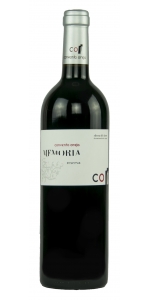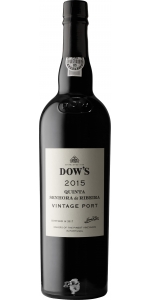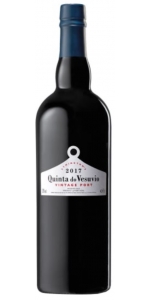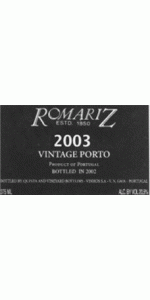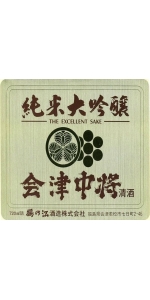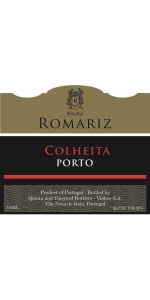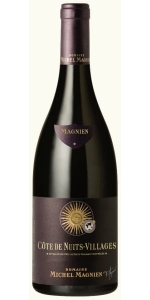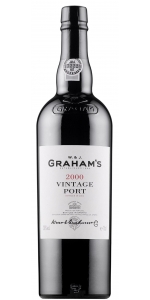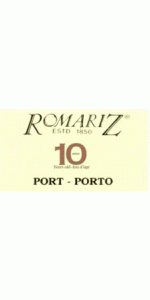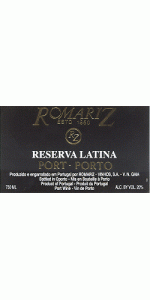Romariz 20 Years Old Tawny
| Country: | Portugal |
| Region: | Douro |
| Winery: | Romariz Port |
| Grape Type: | Port Blend |
| Vintage: | NV |
| Bottle Size: | 750 ml |
Romariz 20 Years Old Tawny is rich, warm and well balanced. Concentrated, firm tannins. Aromas of hazelnuts and walnuts, raisin, honey, caramel and dark chocolate notes. Excellent with desserts, cheese or by itself at the end of a meal.
The Romariz Port Estate
The port house of Romariz was founded in 1850 by Manoel (Manuel) da Rocha Romariz. Manoel was a descendant from a well known Oporto family.
Over the years, Romariz developed business dealings in Brazil and other Portuguese Colonies (Africa and China), and to a lesser extent England. Historically, Romariz was known for wood ports, like Colheitas (single vintage Tawnies) and in top years vintage ports.
In 1966, the Romariz family sold their brand and business to Guimaraens & Co. (who own Fonsecca) and the business continued on. Some years passed by and eventually Fonsecca and Taylor’s joined forces. Today, Fonsecca, Talyor and Romariz share the same winemaker and facility in Vila Nova de Gaia.
Today, Romariz offers a wide range of Ports: wood, vintage, LBV’s and Colheitas. Their main markets are Portugal, Denmark and France. All grapes come from region #2, Cima Corgo, the heart of the best growing area along the Douro River. Romariz being a “Portuguese” port firm, adheres to a rich warm style of port wines.
Convento Oreja Memorias Reserva is made from 100 percent 100% Tempranillo.
The wine comes from a special vineyard at 950 meters altitude. The cuvee is called MEMORIA to pay tribute to good friends and great time spent together.
Deep cherry color. On the nose, the wine is elegant and well balanced with black fruits, reminiscent of vanilla and leather. Hints of spices, minerals and coffee. On the palate the wine is also well balanced and pleasant. Round and elegant with a long and pleasing aftertaste.
Pairs well with pastas, creams and soups. Likewise, these wines are ideal for more subtle and elaborate first courses, like a rice with lobster.
Ideal for grilled red meats and stews and game stews and for the typical roast lamb.
Review:
"Deep garnet to the eye, this wine has a nose of black cherry, cocoa powder and aniseed. A sense of fruit brightness permeates the palate alongside blackberry preserve, orange zest, clove, violet and milk chocolate flavors. Lingering brightness and velvety tannins make for a gorgeous, long-lasting finish. - Mike DeSimone"
- Wine Enthusiast (June/July 2023), 94 pts
Exceptionally aromatic with aromas of violets, hints of blackberry, blackcurrant and black plum on the nose. There is some spice that is balanced with fresh acidity and minerality. A long finish with ripe but firm tannins.
Dow's Senhora da Ribeira can be enjoyed anytime and pairs wonderfully with chocolate desserts and soft cheeses like creamy Stilton or Roquefort.
Review:
Rich and fruity, this wine is packed with intense black-currant flavors. It is perfumed, ripe with a good tannic background. The density of the wine and the firm structure point to a long aging process. Drink this beautifully structured wine from 2026.
-Wine Enthusiast 93 Points
Winemaking:
Senhora da Ribeira has one of the most advanced specialist wineries in the Douro, combining the best of traditional winemaking practice, evolved over centuries, and the latest state-of-the-art automated systems. Three granite ‘lagares’ for foot treading are complemented by three ‘robotic’ lagares, designed by the Symington family and installed in the quinta’s winery in 2001.
It has long been recognised that traditional treading produced some of the finest Ports, but there are some drawbacks involved in traditional treading; temperature control is difficult, there is a limit to how long people are willing to tread and they need to sleep. The winemaker’s options are therefore limited, he or she cannot order treading at different times through the night, or pull people off the picking team at will. Furthermore, emptying the traditional lagar takes a long time; in the meantime the fermentation process is accelerating away. A further handicap arose over recent years, when an increasing scarcity of labour obliged producers to look for less labour-intensive vinification solutions. The Symingtons opted to devise a mechanical means of replicating the proven method of foot treading. The result was the Symington ‘robotic lagar’, an automated treading machine which exactly replicates the gentle action of the human foot and which has revolutionised winemaking in the Douro Valley. This equipment is very expensive but the results have been so good that an increasing proportion of Dow’s finest wines are now made in these automated lagares. Approximately half of the wines for Dow’s much praised 2003 Vintage were vinified in them.
The Senhora da Ribeira’s Quinta Vintage Ports have amassed a highly impressive number of awards: three Gold Medals at the International Wine Challenge, (2008, 2006 and 2001, for the 2005, 2002 and 1999 Vintages, respectively) as well as seven Silver Medals and two Gold Medals at the International Wine & Spirit Competition (London, 2008 for the 2005 Vintage and 2002 for the 1998 Vintage). In September 2006, Jancis Robinson MW wrote, “One very exciting new bottling is Dow’s Quinta da Senhora da Ribeira 2004...this single quinta bottling demonstrates superb quality with wonderful vibrancy. Great wine in any context - not that unlike some California reds! This is definitely a wine to look out for when it is released.”
Wine Profile
The very hot climate through the summer at this vineyard results in highly complex and concentrated wines but very low yields. Colours of the musts in the fermentation tanks are always purple-black due to the very high skin to juice ratio. The old vines add further to the intensity of the wine as they make up a very large percentage of the vineyard. The resulting wine can be described as being the essence of Vintage Port, with powerful wild red-fruit flavours, leading into rich black chocolate notes, the whole balanced by complex, attractive and peppery tannins.
One of the Douro’s most beautiful vineyards, Senhora da Ribeira is located 24km (15 miles) upriver from Quinta do Bomfim in the remote Douro Superior. The vineyard commands a magnificent north bank position, overlooking a broad sweep of the Douro, directly opposite another famous Symington owned vineyard: Quinta do Vesuvio. Senhora de Ribeira was built close to an ancient river crossing, guarded by two 12th century castles on either side of the river built by the Moors during their centuries long occupation of Iberia. A small chapel dedicated to the ‘Lady of the River’ (literally: Senhora da Ribeira) has stood here for centuries and gave the quinta its name. Travellers would pause here to ask for a safe river passage and onward journey.
Senhora da Ribeira’s wines are some of the finest in the Douro and they complement those from Bomfim in the composition of Dow’s classic Vintage Ports. The quinta’s high proportion of old vines (45% are over 25 years old) is of critical importance. The old vines are very low-yielding, producing on average less than 1Kg of grapes each, giving intense and concentrated musts which are ideal for classic Vintage Port. The remainder of the vineyard was replanted as follows: 21% in 2001 and 34% from 2004, the latter involving mainly Touriga Nacional vines. This grape variety - very important for Vintage Port - now represents almost exactly a third of the total planted at the quinta. The entire vineyard has the maximum ‘A’ rating.
As with Bomfim, the consistency of the climate plays a key role, although the rainfall is only half of that experienced at Bomfim: 448mm is the 10 year average. This more extreme climate, hot dry summers and cold, equally dry winters results in wines with unique depth of colour and complexity.
As with Quinta do Bomfim, the best Ports from Senhora de Ribeira are used to make Dow’s Vintage Ports in the great and rare ‘Declared’ years. In the good year’s when Dow’s does not ‘declare’ a Vintage, the best wines of ‘The Lady of the River’ are bottled as Dow’s Quinta de Senhora da Ribeira Vintage Port. They will tend to mature a little earlier than the very rare ‘Declared’ years, but can be every bit as good as some other Vintage Ports.
Quinta do Vesuvio Single Quinta Vintage Port is made from 33% Touriga Nacional, 35% Touriga Franca, 15% Sousão, 12% Alicante Bouschet, 5% Other.
This is a powerful, attention-grabbing wine, with taut muscularity. It offers magnificent aromas of rockrose, mint and hints of ginger. The substantial palate is full with expressive black fruit notes lifted by peppery schist tannins (the seasoning provided by the Sousão). The long, lingering aftertaste indicates impressive ageing potential.
Review:
Deep dark ruby garnet, opaque core, violet reflections, delicate edge brightening. Delicate smoky spice, fine nougat, black berries, ripe figs, candied orange zest. Juicy, elegant, fine extract sweetness, ripe tannins, pleasant freshness, chocolaty in the finish, mineral and long-lasting, extremely elegant style, a large Vesuvio, has class.
-Falstaff 99 Points
The 2017 Vintage Port is a blend of 33% Touriga Nacional, 35% Touriga Franca, 15% Sousão and 12% Alicante Bouschet, plus miscellaneous others filling out the blend. This was bottled about a month before tasting after 18 months in seasoned vats, but the just-bottled sample was not really ready. This was instead a pre-bottling sample. It comes in with 115 grams of residual sugar.
- Wine Advocate 99 Points
"Opaque ruby. A complex, beautifully structured wine from Europe’s hot summer of 2003. Lively spicy, toasted aromas and a ripe and generous palate with layers of rich, dense flavors of dark fruit, chocolate, tobacco, spice box and a hint of marmalade. Finishes dry and long with still firm tannins. A delicious Port that should be paired with Roquefort and other blue cheeses."
- International Wine Review (Succulent Sweet Wines for the Holidays: The Best of 2018), 92 pts
This Junmai Daiginjo has a beautiful nose full of banana, melon and star anise. The all natural brewing process gives this sake a bright fresh palate of plum, lime and minerality with a clean dry finish. A very food friendly sake, and is thought to be best after the meal with a light, smooth, rich cow's milk cheese.
POLISHING RATIO: 40%
ALCOHOL: 16-17%
SMV +/-: +1.0
ACIDITY: 1.2
RICE KOJI: HATTANISHIKI
RICE KAKE: HATTANISHIKI
YEAST STRAIN: PROPRIETARY YEAST
FOOD PAIRINGS: Poached Lobster, Seared Scallops, Tofu, Steamed Dumplings
CHEESE PAIRINGS: Brillat Savarin, Cambozola, Dulce Latte Gorgonzola, Mimolette
Made from Touriga Nacional, Touriga Francesa, Tinta Barroca, Tinta Roriz, Tinto Cão, Tinta Amarela
The color is beginning to denote the age, showing a certain similarity to coffee and waxed wood. The aroma combines quince-jam, delicate orange blossom and a touch of vanilla. Delicious smooth butterscotch and dried fruit flavors.
A Romariz Colheita brings together the finest wines from good extensive stocks to express the individual richness and flavours of the particular year enhanced by the nutty characteristics that come with the Tawny ageing process.
Pairs with nut based desserts, pecan pie and apple strudel.
Domaine Michel Magnien Cote de Nuits-Villages is made from 100 percent Pinot Noir.
Domaine Michel Magnien has evolved into a Burgundy producer of a singular style and philosophy from cellars located in the village of Morey-Saint-Denis. In 1993, Frédéric Magnien persuaded his father Michel to begin domaine bottling. The domaine is now certified biodynamic by Demeter and the wines are produced without the use of new oak.
The domaine’s 45 acres are spread across the villages of Morey-Saint-Denis, Gevrey-Chambertin, Chambolle-Musigny, and Vosne Romanée, with holdings in several premier cru and grand cru vineyards. These include the grand crus Clos de la Roche, Clos Saint-Denis, and Charmes-Chambertin. Frédéric Magnien maintains an average vine age of 50 years.
Côte de Nuits-Villages is from two climats in Brochon: Créole, Les Carrés. Brochon is a neighboring commune of Fixin and Gevrey-Chambertin and often carries similar characteristics of those two villages. The wine was fermented with indigenous yeasts in stainless steel tanks followed by several months aging in 100% used pièce. Around 20% whole clusters were included in the cuvée.
Côte de Nuits-Villages shows bright and fresh red-fruit character with notes of earth and spice. 50-year-old vines contribute weight and richness to this otherwise fresh-tasting Burgundy unadorned with the taste of new oak. It’s a pure expression of red Burgundy from biodynamically farmed grapes.
Red Burgundy might be the world’s most flexible food wine. The wine’s high acidity, medium body, medium alcohol, and low tannins make it very food friendly. Red Burgundy, with its earthy and sometimes gamey character, is a classic partner to roasted game birds, grilled duck breast, and dishes that feature mushrooms, black truffles, or are rich in umami.
W & J Graham's Vintage Port is made from 35% Touriga Nacional, 47% Touriga Franca and various others.
It is with great pleasure that Graham's announces the declaration of the 2000 Vintage, a wine that has been deemed to meet our very exacting standards, and one that shows every promise of living up to the reputation of the very best Vintage ports that the Twentieth Century provided.
This is a landmark wine for Graham's, not only being the first Vintage of a new millennium, but being the first Vintage wine to enjoy the extraordinary results achieved by the new robotic 'lagares' at Malvedos in the inaugural year of our remodelled winery. Significant also has been the decision to include a rather larger proportion of mature Touriga Francesa and Touriga Nacional from Vila Velha, a classic riverside Quinta a short distance downstream from Malvedos, and some spectacular old vine lots from Vale de Malhadas in the Upper Douro. These wines each from family-owned Quintas have been used to reinforce the predominant component from Malvedos and the traditional excellence of the Rio Torto lots from Lages, to produce a rounded and even blend in the hallmark rich Graham style.
Picking began at Malvedos on September 22nd and the last lagar was run off on October 10th, an unusually short and compact Vintage. Fruit arrived in good condition although yields were less than three quarters of a kilogram per vine, and the juice to skin ratio well below normal. 2000 was a year noted for a very low average yield across the Douro, and with the grapes unusually lacking in liquid, the extra amount of treading work required made it an ideal time to employ our new, tireless, mechanical treaders alongside the two original 1890 stone lagares still worked by human feet. It was evident early on in the Vintage from the colour and aroma of the fermenting musts that we were looking at a spectacular year, and after the usual waiting period of sixteen months or so to see how the lots would develop, we have now made our final selection and assembled the final blend.
The blend displays many of the typical Graham aromas of ripe plum and 'esteva' (gum cistus) and is pleasantly smooth on the palate despite its youth. It is full and rich in the mouth with fresh blackberry and red plum notes. Despite the hallmark Graham sweetness in the mouth the finish is long and clean.
As with all Graham Vintages, this is a wine made to last for years and the patience of laying down the wine for fifteen to twenty years will certainly be rewarded.
Review:
Fragrant nose, velvety nutty flavors, rich dried fruit characteristics, powerful, and heady tawny.
Romariz Latina Tawny Reserve is a carefully selected blend of seven to nine year old Tawny Ports are used for "Reserva Latina". The port was created for the Tawny loving Brazilian markets, Reserve of the Latin hence the name "Reserva Latina". This tawny port makes an ideal after dinner offering and a lovely companion to coffee and sweets. Nutty, raisin character, great length and finesse.
- back
Jean-Michel Sorbe Quincy Blanc is made from 100 percent Sauvingon Blanc.
The first nose is expressive and opens up to notes of acacia, citrus (lemon, grapefruit). Full on the palate with lovely freshness. This wine boasts nice balance and good length.
The vines are 15 to 20 years old and are located on the left bank of the Cher River, southwest of Quincy. This vineyard enjoys good exposure to the sun and overlies hillocks composed of sandy alluvial deposits and gravel dating back to the Quaternary Period. Each terroir is managed with minimal intervention in an environmentally friendly approach. Vinification: Slow pressing. Fermentation took place under controlled temperatures (18°C).The wine was aged on fine lees for a minimum of 4 months. It was filtered only once before being bottled.
Pair with crustaceans, asparagus, or goat's cheeses.
After pouring, allow the wine to breathe for a few moments in the glass before enjoying so that it may fully release all of its aromas.
Chavy Chouet Puligny Montrachet Les Enseigneres is 100 percent Chardonnay
100% Chardonnay, aged in 100% new French oak, displaying delightful, crisp, mineral aromas intertwined with toasty and vanilla notes. The result is a well balanced and harmonious Puligny of great finesse.
Aged in 100% New French oak
The Enseigneres is the most renowned of the Puligny-Montrachet villages, thanks to its exceptional geographical and geological location, along with its close neighbors Bienvenues-Batard-Montrachet and Batard-Montrachet.
Displaying delightful, crisp, mineral aromas intertwined with toasty and vanilla notes. The result is a well-balanced and harmonious Puligny-Montrachet of great finesse and good ageing potential.


